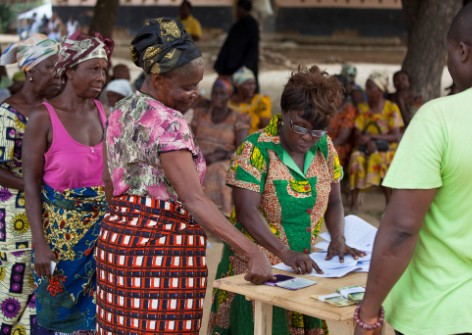LEAP beneficiaries want money disbursed over the table
 Some beneficiaries of the Livelihood Empowerment against Poverty Project (LEAP) in Ellembele in the Western Region and Ashaiman in the Greater Accra Region have stated that they prefer receiving their moneys cash-in-hand.
Some beneficiaries of the Livelihood Empowerment against Poverty Project (LEAP) in Ellembele in the Western Region and Ashaiman in the Greater Accra Region have stated that they prefer receiving their moneys cash-in-hand.
They said they want it to be paid to them directly over the table and without the money going through any channel.
Others have suggested that the monies should be sent to them through the mobile money system of distribution that was tried some time ago.
Fifty-eight out of the 127 of beneficiaries interacted with in a fact-finding initiative have said that the current ezwich system introduced two years ago for the disbursement of the LEAP money was a bit cumbersome to them.
These were some of findings and feedback received through an initiative that sought to gather responses from beneficiaries of the LEAP and the Ghana School Feeding Programme (GSFP) within the two communities, representing rural and peri-urban communities under a Penplusbytes and Open Society Initiative for West Africa (OSIWA) project that started in April 2016.
Presenting the findings at a stakeholders’ forum in Accra, Mr Jerry Sam, Programmes Director at Penplusbytes said in the gathering of the feedback, the beneficiaries suggested that the way the LEAP monies were disbursed to them through ezwich should be reviewed.
The two-year programme ending in April 2018 involve the use of digital tools as a platform to solicit information from the community members and in getting citizens involved in the monitoring of the quality of services delivered under the social protection policies of government.
Mr Sam said the project was focusing on simplifying the LEAP and the GSFP, two critical social interventions, by looking at the objectives of the interventions and developing indicators that would help measure their impact as well as to hold duty bearers accountable.
He said under the initiative, citizens were engaged via SMS, whatsapp groups, and online platforms where they directly sent their comments in web forms and by sms.
The information sent by citizens are then prepared and packaged as evidenced-based document and into policy briefs, which are then sent to appropriate quarters including Ministry of Gender and Social Protection, GSFP Secretariat and to the LEAP directorate to help the authorities get to know what citizens thought about the implementation of the various interventions.
The forum, the third in series, was therefore held to sensitise stakeholders on the level of implementation of the two social interventions in the target communities and to help find solutions to challenges and gaps identified in the implementation of social protection policies.
It was also to garner support in the drive to ensure that there was value for money in the implementation of government policies.
Mr Sam noted that in the gathering of the feedback, the beneficiaries said the LEAP money had improved people status but some of them still relied on other relations for remittances because the monies were still not sufficient to meet their needs.
Pensplusbytes is therefore recommending to the Gender and Social Protection Ministry to collaborate with the disbursing secretariats to engage financial services like the rural banks, which were mainly found in most districts and outsource the distribution of the monies to them so they would have a means of disbursing the fund to the beneficiaries.
Such banks could then disburse the monies by charging a small fee that should be borne by the Ministry, Mr Sam explained.
“Rather than giving people card to cash the money through the ezwich system which many do not know how to access moneys with, we are recommending that the Ministry should engage financial services so that they find innovative means of actually getting the money to the beneficiaries, rather than boxing everybody into one means of payment which is the ezwich, that is not working in certain areas.”
Penplusbytes also suggested the need for a slight increase in the monies being disbursed since most of the beneficiaries said the funds received were not enough.
Mr Sam however lauded the Ministry’s proposal to wean beneficiaries off the LEAP after getting them into productive work and offering them employable skills like dress-making and shea butter processing.
“But then it shouldn’t be cut across because those in the peri-urban districts have a higher cost of living than those in some local district.” he said.
He said Penplusbytes would keep collaborating with the state authorities to ensure that the programmes achieved its target.
Mrs Esther Offei Aboagye, a Local Governance Expert said there was the need for civil society groups to collaborate and monitor and defend social intervention programmes for the vulnerable in the society who mostly could not speak for themselves.
She said the political will to empower the local communities and authorities to oversee local level implementation was also needed.
Source: GNA
